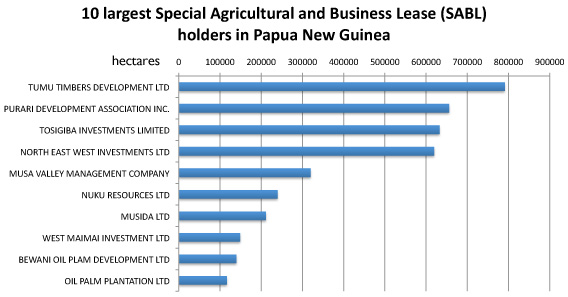Forests spanning an area larger than Costa Rica—5.6 million hectares (13.8 million acres)—have been handed out by the Papua New Guinea government to foreign corporations, largely for logging. Granted under government agreements known as Special Agricultural and Business Leases (SABLs), the land leases circumvent the nation’s strong laws pertaining to communal land ownership. Now, the Association for Tropical Biology and Conservation (ATBC), the world’s largest professional society devoted to studying and conserving tropical forests, is urging the Papua New Guinea government to declare a moratorium on SABLs.
“SABLs, which were originally intended to promote local agricultural development, have been used on a large scale in [Papua New Guinea] to circumvent forestry reforms by granting protracted (often 99-year) land leases, mostly to foreign or multinational corporations,” the ATBC states in a resolution.
SABLs have been granted without permission of the local community, and, in some cases, without even the community’s knowledge, a direct violation of Papua New Guinea’s communal land ownership.
Once a SABL is granted, permits to log the land, aptly known as Forest Clearing Authorities, are handed out by Papua New Guinea’s National Forest Service. Currently almost half the land covered by SABLs—2 million hectares (nearly 5 million acres)—have already received authorization for clearcutting. According to the ATBC much of the forest on the chopping block “is of outstanding biological and cultural significance”.
“These land-clearing authorities will promote the exploitation of native forests by foreign interests without requiring them to comply with existing forestry regulations,” says the ATBC, adding that SABLs are “a clear effort to circumvent prevailing efforts to reform the [Papua New Guinea] forestry industry, which has long been plagued by allegations of weak governance and mismanagement”.
A film about deforestation in Papua.
Before forest communities are alienated from their traditional lands, biodiversity undercut, and forest ecosystem services severely diminished, ATBC says the government should put a moratorium on granting new SABLs and new authorizations to clear-cut forests. In addition, existing SABLs and Forest Clearing Authorities should be put through a “thorough, transparent, and independent review”.
In its resolution, ATBC states it is not trying to undercut Papua New Guinea’s “urgent goal” to reduce poverty in the country, but that such efforts must be wary of “predatory industrial exploitation of the country’s forests, lands and other natural resources, which far too often fail to yield fair or equitable benefits for the majority of [Papua New Guinea] citizens.”
Papua New Guinea to date had been thought to have avoided mass deforestation, thereby retaining one of the last great rainforests outside of the Congo and the Amazon. However, a 2009 study found that between 1972-2002, nearly a quarter of the country’s forests were already lost or degraded by logging.

Chart by mongabay.com.
Related articles
5 million hectares of Papua New Guinea forests handed to foreign corporations

(03/23/2011) During a meeting in March 2011 twenty-six experts—from biologists to social scientists to NGO staff—crafted a statement calling on the Papua New Guinea government to stop granting Special Agricultural and Business Leases. According to the group, these leases, or SABLs as they are know, circumvent Papua New Guinea’s strong community land rights laws and imperil some of the world’s most intact rainforests. To date 5.6 million hectares (13.8 million acres) of forest have been leased under SABLs, an area larger than all of Costa Rica. “Papua New Guinea is among the most biologically and culturally diverse nations on Earth. [The country’s] remarkable diversity of cultural groups rely intimately on their traditional lands and forests in order to meet their needs for farming plots, forest goods, wild game, traditional and religious sites, and many other goods and services,” reads the statement, dubbed the Cairns Declaration. However, according to the declaration all of this is threatened by the Papua New Guinea government using SABLs to grant large sections of land without going through the proper channels.
Stopping export logging, oil palm expansion in PNG in 2012 would cost $1.8b, says economist
(03/07/2011) Stopping logging for timber export and conversion of forest for oil palm plantations would cost Papua New Guinea roughly $2.8 billion dollars from 2012 to 2025, but would significantly reduce the country’s greenhouse gas emissions, according to a new analysis published by an economist from the University of Queensland.
Foreign corporations devastating Papua New Guinea rainforests

(10/21/2010) A letter in Nature from seven top scientists warns that Papua New Guinea’s accessible forest will be lost or heavily logged in just ten to twenty years if swift action isn’t taken. A potent mix of poor governance, corruption, and corporate disregard is leading to the rapid loss of Papua New Guinea’s much-heralded rainforests, home to a vast array of species found no-where else in the world. “Papua New Guinea has some of the world’s most biologically and culturally rich forests, and they’re vanishing before our eyes,” author William Laurance of James Cook University in Cairns, Australia, said in a statement.